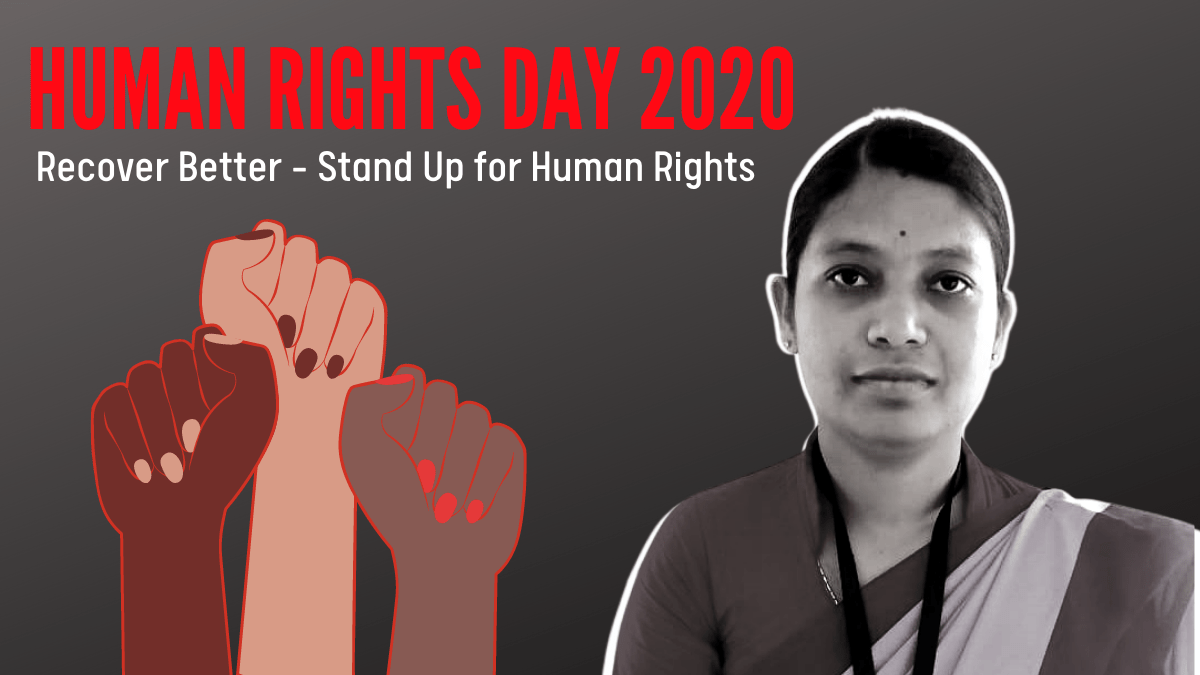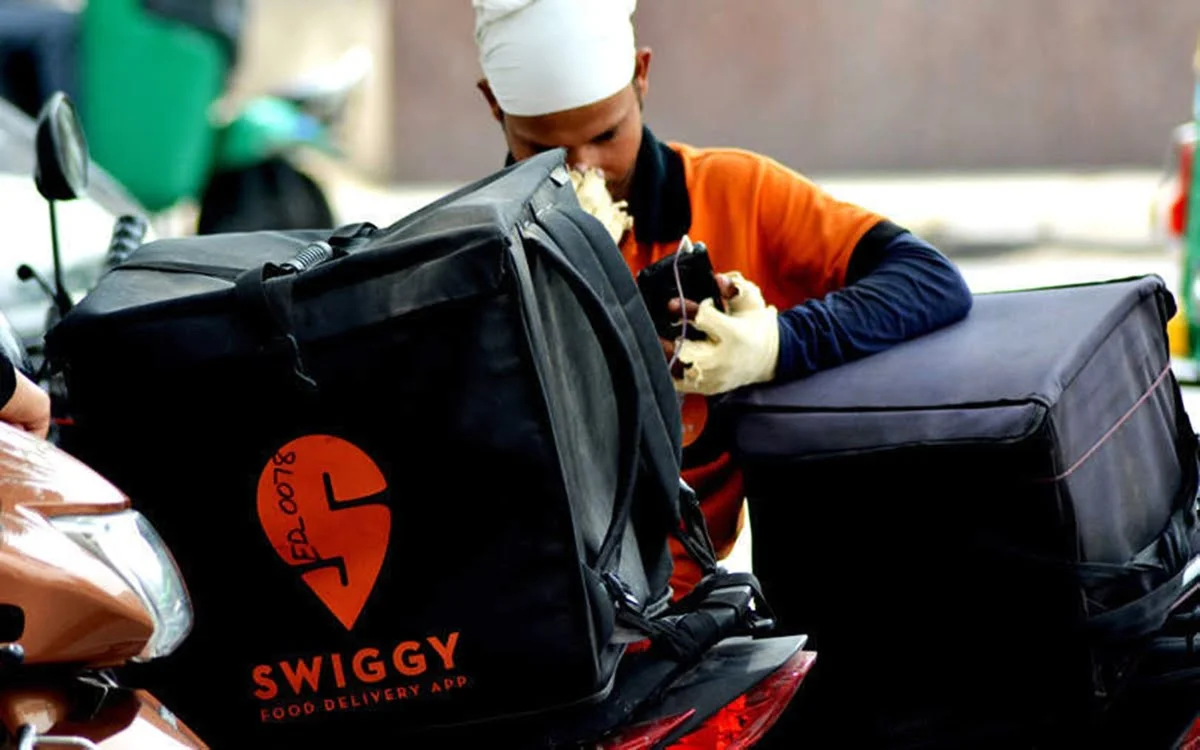In urban India over 50% of the sanitation workforce comprises women. These women work endlessly to ensure our cities run smoothly despite countless odds. They provide the most essential public service but often at the cost of their dignity, safety, health and living conditions, and are far too often invisible, unquantified and ostracised. They face many challenges that stem from this fundamental lack of acknowledgement. During the 2020 COVID-19 pandemic, many of these day-to-day challenges of women sanitation workers were exacerbated and brought to light.
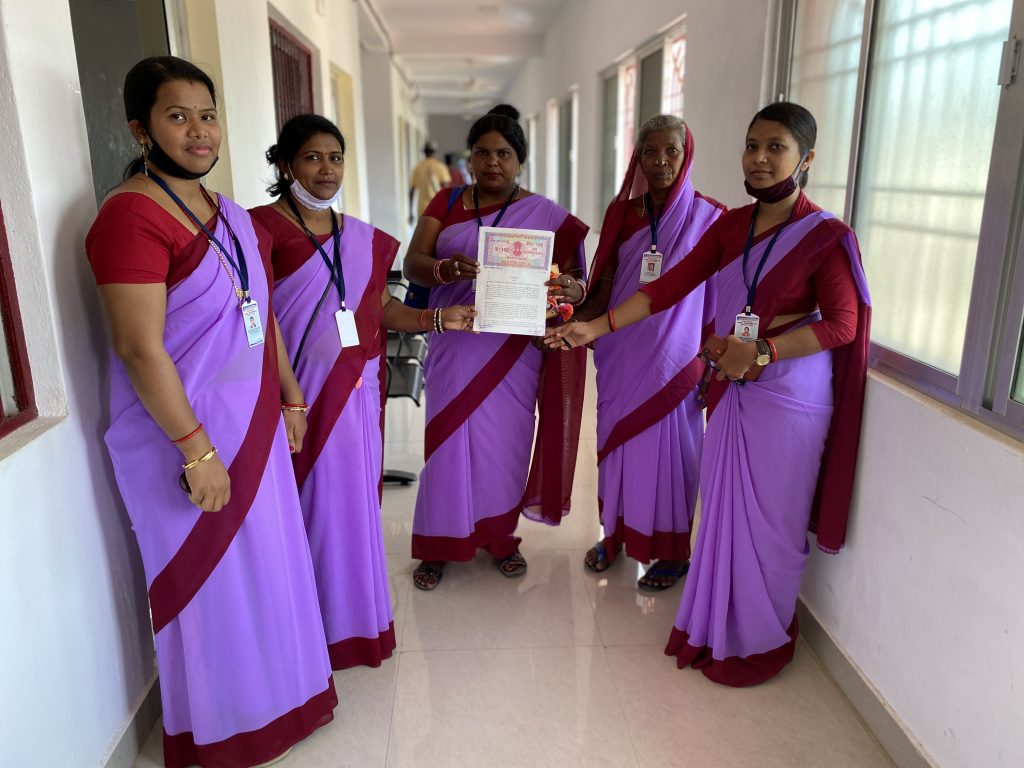
A recent independent report revealed that 96.5% women sanitation workers had no special arrangements for them at their workplace. In Bangalore, several sanitation workers in July marched in protest against the poor management of the pandemic by the Municipal Corporation due to lack of adequate personal protective equipment (PPEs), drinking water and regular sanitation at workplaces. On Human Rights Day, it is important that we recognise and amplify their voices in order to build back better and co-exist in our cities where their rights, safety and dignity is secured.
Anita Mohanty, secretary of the Agrata City Level Federation in Odisha’s Behrampur is one of the many women in Odisha who have been trained and integrated into the state’s city sanitation value chain to lead various sanitation businesses and enterprises through the convergence of the Swachh Bharat Mission and the National Urban Livelihood Mission.
In urban India over 50% of the sanitation workforce comprises women. These women work endlessly to ensure our cities run smoothly despite countless odds. They provide the most essential public service but often at the cost of their dignity, safety, health and living conditions, and are far too often invisible, unquantified and ostracised.
Her work along with other SHG members has been so impactful, that the city level federation was also felicitated by the Ministry of Housing and Urban Affairs with the “Swachhata Excellency Award” in 2019 and by the Hon’ble Chief Minister of Odisha himself for its contribution to sanitation in the state. Anita and Agrata’s SHGs have displayed no shortage of resilience and resourcefulness during the Covid-19 lockdown and have, in turn, strengthened the WSH facilities available in their communities.
Anita shares her sanitation story and how this profession has provided her social and economic empowerment

- How did you become a part of the sanitation workforce?
Anita Mohanty: In 2016, I was introduced to the NGO Parivartan, when they began working in our neighborhood in Behrampur district, Odisha to facilitate the formation of a Women’s Self Help Group (SHG) named ‘Pragati’ under the National Urban Livelihoods Mission. I joined the SHG as the secretary during this time. Shortly after that several SHGs came together to form the Agrata City Level Federation with approximately 7000 women members. I was nominated by the women in the federation to become the secretary.
When the Swachh Bharat Mission was launched in Odisha, our Agrata ALF was roped in by the local municipal officials to run awareness campaigns around it. We received several training and aids for this. During this time, we felt inspired to participate in this cause and contribute towards a cleaner India. In fact, we realised that women could promote sanitation in communities very effectively. That’s why we would encourage SHG members to actively advocate for the cause during our meetings as well.
The Municipal Corporation also recognised our dedication and invited all the SHGs under the Agrata City Level Federation for a training on Faecal sludge management (FSM). On seeing our proactive response, the corporation authorities were keen on training our SHG members to manage on-site operations of a Septage Treatment Plant (STP) for two months. I was happy to be a part of the final team. It was a huge win for our federation, as it was the first time that women SHGs were given the opportunity to participate in operations management at a STP.
- What does your daily routine look like? (roles and responsibilities, initiatives and activities you have been a part of)
Anita Mohanty: As Secretary, I manage several SHGs. My key responsibilities include contract management, selecting trainees and placing SHGs with different responsibilities such as community toilet management, FSTP operations, desludging service requests etc. In the SHG all decisions are made democratically and we do have regular meetings to expedite decision making and also discuss any other challenges. Right now we’re also managing 14 community toilets that are looked after by 14 SHGs.
Even during the lockdown, our group continued to manage the community toilets. Moreover, we made it a practice to note down names of individuals who use the community toilets for better contact tracing in case any of them tested positive for COVID-19. The Municipal Corporation provided us the necessary resources to ensure that we could sanitise the toilets and surfaces in a contactless manner every hour.
- In urban India 50% of the sanitation workforce is made up of women. Therefore, as a woman in the sanitation workforce, what kind of personal and professional challenges have you faced in your line of work? What did you do to overcome these challenges?
Anita Mohanty: Whenever a woman SHG member goes out of the house for work, she faces resistance from her family. We used to face this rather frequently, when the SHGs were initially constituted. But now, all it takes is the support and cheerleading from the larger SHG community to overcome this resistance and lead the women into dignified livelihoods and inclusive societies.
On the professional front, understanding the terms and conditions in contracts for STP management has been slightly challenging as there is no one available to clarify these terms once the training and handover is complete. As most of the members in the SHG aren’t educated, while training on the technical aspects of operations management were well received, it is difficult for members to undertake the softer management aspects such as documentation, raising invoices, bookkeeping, processing payments etc.
I think these are also important training that should be a part of the training curriculum for STP Management because it is important to running any kind of business. It would be useful to have standardized formats for these processes which would simplify these management processes for the women working at the STP.
Also read: Open Defecation Is Much More Than Just A Sanitation Problem
- How has your SHG/Sanitation Enterprise empowered you and other women you work with? How has this contributed to your social and economic empowerment?
Anita Mohanty: In our society women are often perceived to be docile. In terms of employment, even before the introduction of SHGs women sat at home and worked in small scale enterprises dealing with spices, pickles etc. So for society to accept women leaving their homes to earn a living by working in the desludging business and at the STP was initially met with some backlash because they felt that these were jobs suited to men. Only after seeing the women do their job so well in managing the STPs and the community toilet and earning a stable monthly income do they see the potential in SHGs and its role in empowering women. There’s also this sense of pride within our families that the women of the household are now working.
In Bangalore, several sanitation workers in July marched in protest against the poor management of the pandemic by the Municipal Corporation due to lack of adequate personal protective equipment (PPEs), drinking water and regular sanitation at workplaces.
- As a leader, how have you in your position helped/influenced other women to become a part of the sanitation workforce given societal prejudices?
Anita Mohanty: On the personal front, when a woman is a working professional they need to manage both their home and the work. In some cases, husbands are hesitant to allow their wives to work through the SHGS as they feel housework would suffer. In such cases, I have made personal visits to explain to them how this work can support families better with dual incomes and that it won’t interfere with running the house.
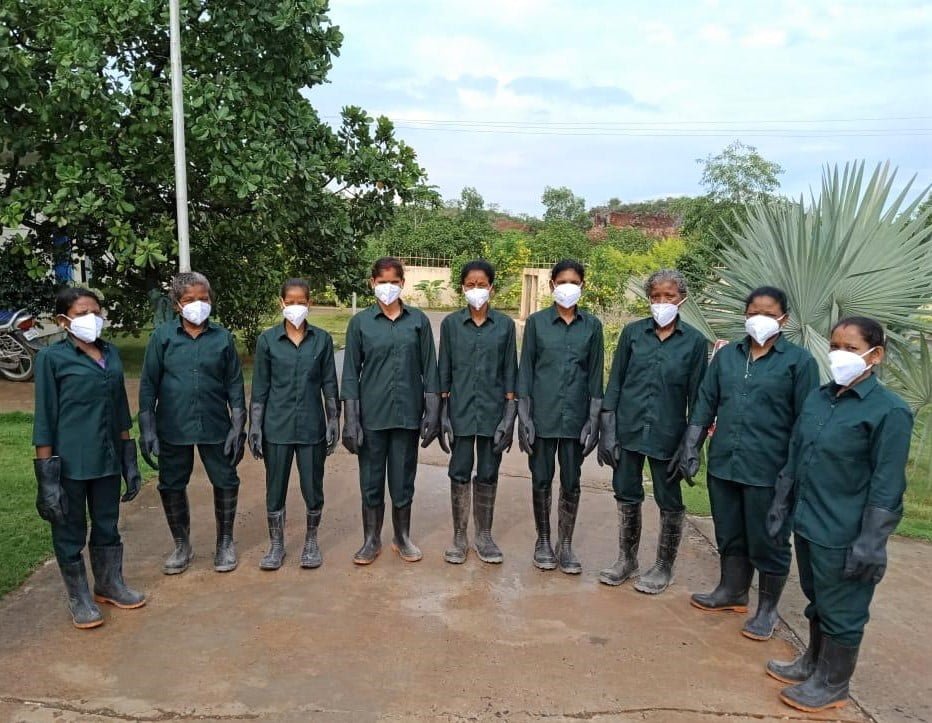
- What are the challenges you faced or are currently facing during the lockdown and the COVID-19 pandemic?
Anita Mohanty: During the pandemic, we made it very clear to women over 60 and those living with co-morbidities to refrain from working for their safety and health. This led to some internal disputes and some members felt that they were being denied work because of biases. But, I made them understand the risks involved with exposure to the virus at work and that these decisions were made with their safety as a top priority.
Even with the pandemic worsening, the rest of us didn’t stop any of our activities and this has even benefited us in such harsh times—despite everything being closed, the government relied on the strength of SHGs for community welfare. We managed to maintain our financial stability and we worked with utmost safety and precautions. We were provided with protective equipment and sanitisers by the authorities. Additionally, we benefited immensely from the Urban Wage Employment Initiative (UWEI), where some of our SHG members were involved with activities ranging from construction to home-based packaging industries to tide over the economic pressures
- What support (institutional, societal) do you believe can be instrumental in the welfare of women sanitation workers who are working across the sanitation value chain?
Anita Mohanty: As many of the plants that are operational or will soon be operational are located outside the town, it would be great if the municipal corporation can support the women sanitation workers by building quarters for women to stay during their duty as travelling back and forth to the site can be both time-consuming and expensive.
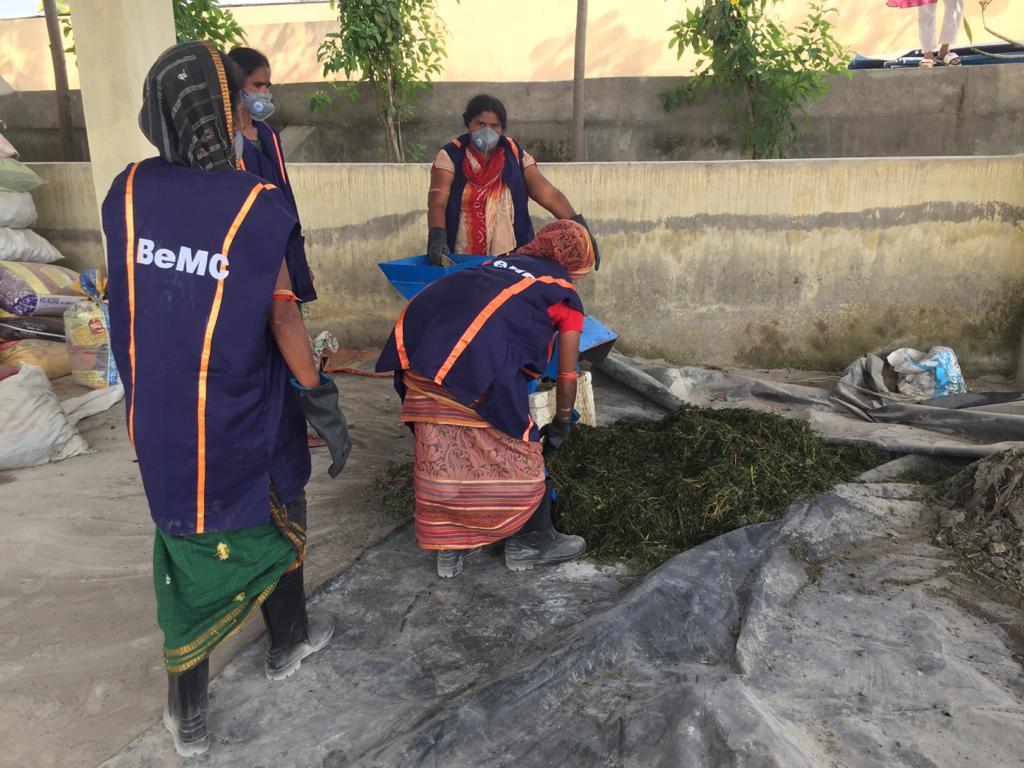
Also read: How To Help Sanitation Workers During COVID-19?
Voices like that of Anita are only growing and they need to be amplified increasingly. Odisha’s inclusive sanitation model needs to be delved upon, spoken about and replicated across the country, if not the world! The National Faecal Sludge and Septage Management Alliance, among several other fine WSH initiatives, is well on its way to facilitating this knowledge transfer and adoption and making the voices of the most vulnerable in the sanitation sector brought into public and government focus.
About the author(s)
Dasra is catalyzing India's strategic philanthropy movement to transform a billion lives with dignity and equity. In 1999, Dasra was founded on the simple premise that supporting non-profits in their growth will scale their impact on the vulnerable lives they serve. Dasra accelerates social change by driving collaborative action and powerful partnerships with funders, social enterprises and other key stakeholders.
